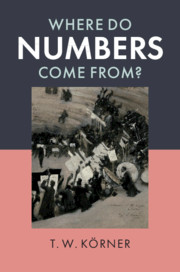'Clearly this book is probing the fundamentals of mathematical analysis and will be useful as an extra reading for an introductory calculus course. It will certainly satisfy those readers who are looking for abstraction and who want to extract the maximal number of results from the minimal set of axioms. The historical elements on the side are entertaining … It is an excellent way to get in touch with the foundations of mathematics at a relatively elementary level.'
Adhemar Bultheel
Source: European Mathematical Society
‘Körner begins with historical anecdotes that illustrate how numbers have been used. He then proceeds to develop number systems axiomatically with careful definitions, theorems and proofs. His characteristic humor, digressions and historical insights are present throughout, but this is a rigorous treatment that seems - in some measure - to follow Dedekind’s original approach.’
Bill Satze
Source: MAA Reviews
‘This is a comfortably paced introduction to the various notions of numbers … The relatively high level of abstraction of the second and third parts suggests that the ideal readership for this book is students who have taken at least some advanced undergraduate classes in mathematics. Classroom use would be possible in a philosophy of mathematics course …’
M. Bona
Source: Choice
‘The text is peppered with quotes from classical (ancient civilizations), modern (nineteenth and early twentieth centuries), and contemporary mathematical texts; classical, modern and current approaches to most of the subjects covered are offered; and practical applications of most of the materials introduced are carefully explained. As a consequence, there is a constant dialogue between past and present from both a theoretical and a practical point of view, which makes this book interesting from a conceptual point of view and useful as an introductory working tool.’
Capi Corrales-Rodriganez
Source: Mathematical Reviews
‘Fans of Körner’s other books, like The Pleasures of Counting, will appreciate the conversational style of this book, which provides plenty of amusing footnotes, historical context, quotations and poems, while never relenting on the rigour of the mathematics.’
Julia Collins
Source: London Mathematical Society Newsletter
‘Where Do Numbers Come From? certainly adds to the pleasure of mathematics as well as narrating a journey that surely every mathematician should undertake at some stage. As such, I enthusiastically recommend it to all Gazette readers.'
Nick Lord
Source: The Mathematical Gazette



